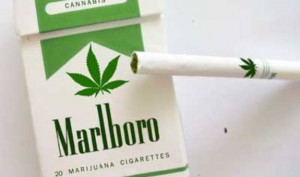Related Research Articles
There are multiple urban legends centering around the fast-food chain McDonald's. These legends include claims about the food and allegations of discrimination by the company.

In the United States, increased restrictions and labeling of cannabis as a poison began in many states from 1906 onward, and outright prohibitions began in the 1920s. By the mid-1930s cannabis was regulated as a drug in every state, including 35 states that adopted the Uniform State Narcotic Drug Act. The first national regulation was the Marihuana Tax Act of 1937.

The use, sale, and possession of cannabis over 0.3% THC in the United States, despite laws in many states permitting it under various circumstances, is illegal under federal law. As a Schedule I drug under the federal Controlled Substances Act (CSA) of 1970, cannabis over 0.3% THC is considered to have "no accepted medical use" and have a high potential for abuse and physical or psychological dependence. Cannabis use is illegal for any reason, with the exception of FDA-approved research programs. However, individual states have enacted legislation permitting exemptions for various uses, including medical, industrial, and recreational use.

Cannabis in Colorado has been legal for medical use since 2000 and for recreational use since late 2012. On November 7, 2000, 54% of Colorado voters approved Amendment 20, which amended the State Constitution to allow the use of marijuana in the state for approved patients with written medical consent. Under this law, patients may possess up to 2 ounces (57 g) of medical marijuana and may cultivate no more than six marijuana plants. Patients who were caught with more than this in their possession could argue "affirmative defense of medical necessity" but were not protected under state law with the rights of those who stayed within the guidelines set forth by the state. The Colorado Amendment 64, which was passed by voters on November 6, 2012, led to recreational legalization in December 2012 and state-licensed retail sales in January 2014. The policy has led to cannabis tourism. There are two sets of policies in Colorado relating to cannabis use: those for medicinal cannabis and for recreational drug use along with a third set of rules governing hemp.

In the United States, the use and possession of cannabis is illegal under federal law for any purpose by way of the Controlled Substances Act of 1970 (CSA). Under the CSA, cannabis is classified as a Schedule I substance, determined to have a high potential for abuse and no accepted medical use. Despite this, most states have legalized either or both the medical and recreational use of cannabis.

Colorado Amendment 64 was a successful popular initiative ballot measure to amend the Constitution of the State of Colorado, outlining a statewide drug policy for cannabis. The measure passed on November 6, 2012, and along with a similar measure in Washington state, marked "an electoral first not only for America but for the world."

The legal history of cannabis in the United States began with state-level prohibition in the early 20th century, with the first major federal limitations occurring in 1937. Starting with Oregon in 1973, individual states began to liberalize cannabis laws through decriminalization. In 1996, California became the first state to legalize medical cannabis, sparking a trend that spread to a majority of states by 2016. In 2012, Washington and Colorado became the first states to legalize cannabis for recreational use.

The Daily Currant was an American satirical news blog that focused on politics, technology, and entertainment. A number of its satirical stories have been taken for true news reports by press.
National Report is a fake news website that posts fictional articles related to world events. It is described by Snopes.com as a fake news site, by FactCheck.org as a satirical site, and by The Washington Post as part of a fake-news industry, making profits from "duping gullible Internet users with deceptively newsy headlines." The National Report describes itself as a "news and political satire web publication" and provides a disclaimer that "all news articles contained within National Report are fiction". The disclaimer, however, is not printed on the main page, which instead claims that the website is "America's #1 Independent News Source".

Charlotte's Web is a brand of high-cannabidiol (CBD), low-tetrahydrocannabinol (THC) products derived from industrial hemp and marketed as dietary supplements and cosmetics under federal law of the United States. It is produced by Charlotte's Web, Inc. in Colorado. Hemp-derived products do not induce the psychoactive "high" typically associated with recreational marijuana strains that are high in THC. Charlotte's Web hemp-derived products contain less than 0.3% THC.
Cannabis tourism in the United States is a form of drug tourism that exists in recreationally legal cannabis states. As of 2022 there are 21 states, Washington D.C. and Guam that have legalized recreational cannabis.

Cannabis dispensaries in the United States or marijuana dispensaries are a local government regulated physical location, typically inside a retail storefront or office building, in which a person can purchase cannabis and cannabis related items for medical or recreational use. First modeled in Amsterdam in the late 1970s where they were innocently called coffee shops, it would take the Americans more than a generation to successfully duplicate the idea of a retail cannabis storefront. Unlike in the Dutch coffee shops, today dispensary customers are prevented from consuming cannabis on the site of a regulated dispensary in all known markets.

GMO conspiracy theories are conspiracy theories related to the production and sale of genetically modified crops and genetically modified food. These conspiracy theories include claims that agribusinesses, especially Monsanto, have suppressed data showing that GMOs cause harm, deliberately cause food shortages to promote the use of GM food, or have co-opted government agencies such as the United States Food and Drug Administration or scientific societies such as the American Association for the Advancement of Science. Critics charge that GMO conspiracy theories are largely promulgated by those opposing the production and sale of GMOs, and instances of unsubstantiated conspiracy theories have lately occurred in the context of public health issues that are mostly unrelated to GMOs, including the 2015–16 Zika virus outbreak and concerns over food safety at Chipotle Mexican Grill.

Cannabis in Washington relates to a number of legislative, legal, and cultural events surrounding the use of cannabis. On December 6, 2012, Washington became the first U.S. state to legalize recreational use of marijuana and the first to allow recreational marijuana sales. The state had previously legalized medical marijuana in 1998. Under state law, cannabis is legal for medical purposes and for any purpose by adults over 21.
Planet X637Z-43 is a 2015 internet hoax purporting to document the discovery by NASA of a planet covered in cannabis. Supposedly it was one of 715 planets discovered by the Kepler space telescope in 2014. The story originated on a fake news website, NewsWatch28.

The Marlboro M Hoax was a false rumor originating from satire news website Abril Uno on April 1, 2016. It was an April Fools prank.
Hurricane Shark and Street Shark are nicknames for several claimed instances of a live shark swimming in a flooded urban area, typically in the aftermath of a hurricane. For more than a decade, all media purporting to document such claims—most notably an image of a shark swimming on a flooded freeway—were debunked as fabrications. However, during Hurricane Ian in 2022, the Associated Press verified a video taken by Dominic Cameratta of a shark or other large fish swimming in flooded Fort Myers, Florida; one consulted expert concluded that the fish was "a juvenile shark" while another was unable to determine whether it was a shark. Both the re-emergence of the hoax in hurricane after hurricane and the eventual appearance of a plausible claim have been the subject of commentary and amusement; Daniel Victor of The New York Times described the Associated Press's findings as "like discovering Bigfoot is real".
References
- ↑ Mikkelson, David (September 13, 2014). "Fact Check: Colorado Pot Shop Accepting Food Stamps – Taxpayer Funded Marijuana for Welfare Recipients". Snopes.com . Retrieved November 25, 2018.
- ↑ Bartels, Lynn (January 14, 2014). "Fake report about Colorado pot shops, food stamps creates havoc". The Denver Post . Retrieved November 25, 2018.
- ↑ "Colorado bill targets fears that food stamp money is used for marijuana". The Guardian . January 30, 2015. Retrieved November 25, 2018.
- ↑ "Colorado considers ban on welfare cards at pot shops". Chicago Tribune . January 30, 2015. Retrieved November 25, 2018.
- ↑ 21 CFR 1308.11 Archived 2009-08-27 at the Wayback Machine (CSA Sched I) with changes through 77 FR 64032 (October 18, 2012). Retrieved November 25, 2018.